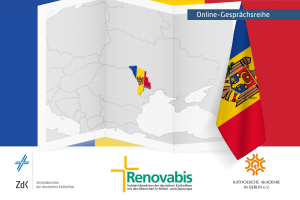
Quelle: Collage Renovabis
For English Text please see below.
Aufzeichnung der Veranstaltung
Copyright der im Video verwendeten Grafik: https://commons.wikimedia.org/wiki/File:Moldova_harta_administrativa.png
Thema der Veranstaltung
Die rund 2,5 Millionen Einwohnerzählende Republik Moldau ringt seit Jahrzehnten um ihre Selbstbestimmung im geopolitischen Spannungsfeld von West und Ost. Seit 2022 ist die ehemalige Sowjetrepublik EU-Beitrittskandidat. Die Parlamentswahlen am 28. September 2025 hat die „Partei der Aktion und Solidarität“ (PAS) unter Präsidentin Maia Sandu mit ihrem pro-europäischen Kurs gewonnen. Vorwürfe russischer Manipulation und der Ausschluss einer prorussischen Partei kurz vor der Wahl zeigen aber, wie umkämpft der künftige Kurs des Landes ist.
Die gesellschaftliche Polarisierung in der Republik Moldau spiegelt sich auch in der parallelen Existenz zweier orthodoxer Kirchen wider, denen die Mehrheit der Bevölkerung angehört. Die katholische Kirche ist eine kleine Minderheit, genießt aber Anerkennung für ihr soziales Engagement. Die Auswirkungen des
russischen Angriffskrieges gegen die Ukraine haben die Herausforderungen für die Republik Moldau − eines der ärmsten Länder Europas mit wechselhafter Geschichte − weiter verschärft: die Aufnahme zahlreicher Geflüchteter aus dem Nachbarland, stark gestiegene Lebenshaltungskosten, hohe Arbeitslosigkeit und eine insgesamt prekäre sozio-ökonomische Lage, die dazu führt, dass viele Moldauerinnen und Moldauer auf der Suche nach Einkommen nach Westen oder Russland gehen, und die Republik zu einem Brennpunkt des Menschenhandels macht.
Wir hörten und sprachen mit
- Anton Coșa, Bischof der römisch-katholischen Diözese Chișinău, Chișinău
- Pfarrer Sergiu Aga, Priester der Rumänischen Orthodoxen Kirche und Direktor der Organisation „Filantropia Creştina” („Christliche Philanthropie“), Orhei
- Corina Gîrla, Leiterin des Goethe-Zentrums, Chișinău
- Moderation: Theresa Grabinger, Auslandsdienst-Referentin beim Malteser Hilfsdienst, Köln
Über die Reihe „Listen to the East“
Erfahrungen, Wahrnehmungen und Analysen zur sozialen und gesellschaftlichen Lage aus Osteuropa sind Thema der Online-Gesprächsreihe „Listen to the East“. Sie wird veranstaltet von Renovabis, dem ZdK und der Katholischen Akademie in Berlin.
- Videoaufzeichnungen früherer Veranstaltungen in der Reihe „Listen to the East!“ sind als Playlist auf dem YouTube-Kanal der Katholischen Akademie in Berlin abrufbar:
Hier ansehen
Kontakt
- Heike Faehndrich, Renovabis, hf@renovabis.de
- Claudia Gawrich, Zentralkomitee der deutschen Katholiken, claudia.gawrich@zdk.de
- Dr. Maria-Luise Schneider, Katholische Akademie in Berlin, schneider@katholische-akademie-berlin.de
Republic of Moldova today
Churches and Society after the Parliamentary Elections
Recording of the event
Copyright of the graphic used in the video: https://commons.wikimedia.org/wiki/File:Moldova_harta_administrativa.png
Subject of the Event
With a population of around 2.5 million the Republic of Moldova has been struggling for decades for self-determination amid geopolitical tensions between West and East. The former Soviet republic has been a candidate for EU membership since 2022. The parliamentary elections on 28 September 2025 were won by the Party of Action and Solidarity (PAS) under President Maia Sandu with its pro-European course. However, accusations of Russian manipulation and the exclusion of a pro-Russian party shortly before the elections show how disputed the country's future direction is.**
The societal polarisation in the Republic of Moldova is also reflected in the parallel existence of two Orthodox Churches, to which the majority of the population belongs. The Catholic Church is a small minority but enjoys recognition for its social commitment. The effects of Russia's war of aggression against Ukraine have intensified the challenges for the Republic of Moldova, one of the poorest countries in Europe with a varied history: the reception of numerous refugees from the neighbouring country, a sharp rise in the cost of living, high unemployment and an overall precarious socio-economic situation, which leads many Moldovans to seek income in the West or Russia and has made the republic a hotspot for human trafficking.
We listened to and talked with
- Anton Coșa, Bishop of the Roman Catholic Diocese Chișinău, Chișinău
- Rev. Sergiu Aga, Priest of the Romanian Orthodox Church and Director of the organisation “Filantropia Creștină” (“Christian Philanthropy”), Orhei
- Corina Gîrla, Director of the Goethe-Zentrum, Chișinău
- Moderation: Theresa Grabinger, Foreign Aid Officer at Malteser Hilfsdienst, Cologne
About the Series "Listen to the East"
Experiences, perceptions and analyses of the social and societal situation in Eastern Europe are the subject of the online discussion series “Listen to the East“. It is organised by Renovabis, the ZdK and the Catholic Academy in Berlin.
- Video recordings of previous events of our series “Listen to the East!” are available as a playlist on the YouTube channel of the Catholic Academy in Berlin:
Watch here
Contact
- Heike Faehndrich, Renovabis, hf@renovabis.de
- Claudia Gawrich, Zentralkomitee der deutschen Katholiken, claudia.gawrich@zdk.de
- Dr. Maria-Luise Schneider, Katholische Akademie in Berlin, schneider@katholische-akademie-berlin.de
